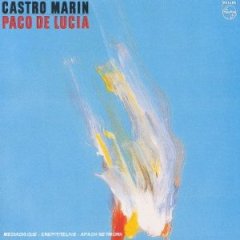Paco De Lucia - Castro Marin (1981)
Paco De Lucia - Castro Marin (1981)

1. Monasterio de Sal
2. Gitanos Andaluces
3. Castro Marin
4. Herencia
5. Convite
6. Palenque
7. Huida
Musicians: Paco de Lucía - Flamenco guitar Larry Coryell - Acoustic guitar John McLaughlin - Acoustic guitar, 12 strings guitar Carles Benavent - Bass Guitar
Paco de Lucia is nothing short of a legend in the guitar world, let alone the world of flamenco. Lauded as a child prodigy, he became an institution and as important to modern guitar playing - in my humble opinion - as Andres Segovia, Charlie Christian or Django Reinhardt. However, it is in his later career, starting in the '70s, when he went on to spawn a whole new language within flamenco, despite leaving some of the rabid traditionalists behind in his wake.
Part of that journey was his work with jazz musicians, initially with Al Di Meola and later with Chick Corea, Larry Coryell and John McLaughlin. I believe his first such live concert was with the later two, and this led to the eventual trio of Di Meola/McLaughlin/de Lucia and the famous "Friday Night in San Francisco" album. However, in many ways, this album is more rewarding. It also led to his more modern group setting, incorporating electric bass and extended improvisation.
If purely for the more traditional pieces, this album finds Paco arguably at a high point in his career, technically and compositionally, as well as in terms of maturity and innovation. Whilst earlier collections (e.g. "Almoraima") show more straight-ahead flamenco traditionalism and bravado, this album brings together mature, well composed and innovative pieces, with experimentation in the world of jazz.
It also marks a change in approach to production and arrangement on Paco's albums: whereas earlier albums such as "Almoraima" often presented some gimicky aspects (the "payo" ensemble singing in particular) and syrupy sound treatment, here the sound is clear, bright and present, with a more subtle reverb, allowing the guitar to feel much closer to the listener.
All the pieces are De Lucia originals. "Monestario De Sal" is a beautiful "Colombianas" in a dropped D-tuning and a Mixolydian modal feel, that exhibits exuberance and astounding brio without being crass. "Gitanos Andaluces" is arguably his most complete and recognisable Bulerias and a classic rendition of this form. "Castro Marin" (Fandango), and "Herencia" (Solea) are all arguably some of his finest renditions of these forms and astound with their profundity as much as their masterful execution and jaw-dropping technique. For these pieces, and the closing "Huida", this album contains some of his most memorable themes and should be rated as one of Paco's finest albums.
But also hiding on this album are Larry and John. "Convite", a Paco piece and duet with Larry, starts off with dissonant 9th chords descending in whole tones, and is both a rumba and a jazz piece. Larry Coryell offers a short masterclass in forced harmonics and how to swing and his solo his genuinely cool. Overall, there is a freshness and playfulness about this piece that smacks of true innovation and exploration. His playing is good enough to overlook his sometimes questionable technique.
"Palenque" (meaning, literally, a "cock fighting pit") pits the three of these players together in trio format and again has the spirit of adventure that perhaps was lacking in later trio albums. All three players turn in splendid improvisations. It's may be not as polished as the De Meola albums, but it doesn't really suffer for that and indeed, feels more like the later duo appearances that De Lucia and McLaughlin were going to make after "Passion, Grace and Fire" was released.
All in all then, a splendid and very complete work, and a must have album for those seeking out the best of his collaborations outside of flamenco. ---DVDER, amazon.com
download: uploaded nornar yandex 4shared mediafire solidfiles mega filecloudio ziddu
Last Updated (Thursday, 27 February 2014 00:24)








